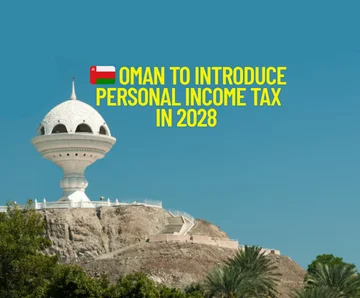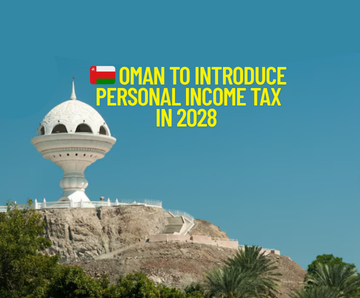Oman Personal Income Tax 2028 Key Guide: A comprehensive guide on Oman’s upcoming personal income tax, including rules, implementation timeline, exemptions, and compliance steps for individuals and businesses.
Oman’s announcement to introduce personal income tax from 2028 represents a major shift from its long-standing tax-free income model to a more diversified and sustainable fiscal framework. The upcoming oman personal income tax 2028 will affect Omani citizens, expatriates, and employers. This guide explains the expected tax rules, implementation timeline, compliance requirements, and practical steps individuals and businesses should take to prepare in advance.
Table of Contents
What Is Personal Income Tax in Oman?

Personal income tax in Oman is a tax imposed on an individual’s earnings, including salaries and other forms of personal income. Currently, Oman does not levy personal income tax, but the government has announced that Oman personal income tax 2028 will be introduced as part of broader economic reforms. This initiative supports Oman Vision 2040 by reducing reliance on oil revenues and strengthening long-term fiscal sustainability. The Oman Tax Authority will be responsible for regulating, administering, and enforcing the Oman Personal Income Tax 2028 framework.
Overview of Oman’s New Personal Income Tax System
- Applies to personal income such as salaries and other individual earnings
- Scheduled to be introduced from 2028
- Part of Oman Vision 2040 economic reform strategy
- Aims to diversify government revenue and strengthen fiscal sustainability
- Regulated and administered by the Oman Tax Authority
Why Oman Is Introducing Personal Income Tax
Oman is introducing oman personal income tax 2028 to reduce its reliance on oil revenues and create a stable, diversified source of government income. This reform aligns with Oman Vision 2040, supporting fiscal sustainability and long-term economic growth. Oman personal income tax 2028 will help fund public services and infrastructure while ensuring a balanced and modernized tax system. Additionally, the move reflects global tax reforms and regional GCC trends, positioning Oman alongside neighboring countries in adopting structured personal taxation.
- Reduces Oman’s dependence on oil revenue
- Creates a stable and diversified source of government income
- Supports fiscal sustainability and long-term economic growth
- Funds public services and infrastructure development
- Aligns Oman with global tax reforms and GCC regional trends
Who Will Be Affected by Oman’s Personal Income Tax?
Oman’s personal income tax will apply to both Omani nationals and expatriates earning income in the country. Under oman personal income tax 2028, residents will be taxed on their Oman-sourced income, while non-residents may also be liable depending on the final legislation. The tax will cover both employees and self-employed individuals, ensuring broad compliance across the workforce. The government is expected to introduce exemptions or minimum income thresholds to protect lower-income earners. Employers will need to update payroll systems and processes to ensure proper withholding, reporting, and compliance with the new tax framework.
Oman Personal Income Tax Implementation Timeline
Oman’s personal income tax will be rolled out in a structured, phased approach to give individuals and businesses sufficient time to prepare. Under oman personal income tax 2028, the timeline will cover the policy announcement, preparation phase, and mandatory implementation starting in 2028. Early awareness and planning are essential to ensure smooth compliance and avoid penalties once the tax is enforced.
Policy Announcement & Legal Framework
The government has officially announced the introduction of personal income tax, signaling a historic shift in Oman’s fiscal policy. As part of oman personal income tax 2028, draft laws have been released for public consultation, allowing stakeholders to review proposed regulations and provide feedback. This phase establishes the legal framework and clarifies tax rules, obligations, and compliance requirements.
Preparation & System Readiness Phase
During this stage, employers and payroll providers are expected to update systems, train staff, and ensure all processes comply with the new tax framework under oman personal income tax 2028. Awareness campaigns will also be conducted to educate residents, expatriates, and businesses about their obligations, filing procedures, and the impact on salaries and benefits. Proper preparation during this phase will help minimize operational disruptions.
Mandatory Implementation in 2028
From 2028, personal income tax will become mandatory for eligible individuals. Under oman personal income tax 2028, the effective date will mark the start of the first tax year, requiring all residents and liable non-residents to file tax returns and remit payments in line with regulations issued by the Oman Tax Authority. Businesses will also need to comply with payroll withholding and reporting obligations, making early adaptation critical for smooth operations.
Expected Key Features of Oman’s Personal Income Tax
Oman’s personal income tax framework is designed to ensure fairness, transparency, and broad coverage. Under oman personal income tax 2028, the system will clearly define who is liable, which types of income are taxable, applicable rates, and available deductions, balancing revenue collection with taxpayer protections. Proper understanding of these features will help individuals and employers prepare early and avoid compliance issues. The framework also aims to align Oman with international tax practices, making the system predictable and efficient.
Tax Residency Rules
Residency criteria will determine who is liable for personal income tax. Under oman personal income tax 2028, individuals spending a significant number of days in Oman or having strong economic ties to the country will be considered residents for tax purposes. Expatriates working in Oman may also be subject to taxation on Oman-sourced income, depending on their residency status and applicable exemptions. Understanding residency rules is essential for both residents and non-residents to correctly calculate tax obligations.
Taxable Income Categories
The tax will cover multiple forms of income, including salaries, wages, allowances, and bonuses. Under oman personal income tax 2028, additional income sources such as professional fees, commissions, or other Oman-sourced earnings may also be included within the taxable base, ensuring comprehensive coverage. Awareness of which income types are taxable will help individuals plan their finances and maintain accurate records.
Tax Rates & Thresholds (Expected)
While exact rates are yet to be finalized, a progressive tax structure is anticipated. Under oman personal income tax 2028, higher income levels are expected to attract higher rates, with income divided into slabs and exemptions or lower rates applied to lower-income earners to ensure fairness. Clear guidance on rates and thresholds will help taxpayers anticipate liabilities and plan accordingly.
Deductions & Exemptions
The tax system is expected to allow personal allowances and potential family or social deductions. Under oman personal income tax 2028, these deductions will reduce taxable income, protecting low- and middle-income individuals and supporting taxpayers with dependents or specific social responsibilities. Proper use of available exemptions will help individuals minimize tax liability while remaining fully compliant.
Expected Key Features of Oman’s Personal Income Tax
Oman’s personal income tax framework is designed to ensure fairness, transparency, and broad coverage. Under oman personal income tax 2028, the system will clearly define who is liable, which types of income are taxable, applicable rates, and available deductions, balancing revenue collection with taxpayer protections. Proper understanding of these features will help individuals and employers prepare early and avoid compliance issues. The framework also aims to align Oman with international tax practices, making the system predictable and efficient.
Tax Residency Rules
Residency criteria will determine who is liable for personal income tax. Under oman personal income tax 2028, individuals spending a significant number of days in Oman or having strong economic ties to the country will be considered residents for tax purposes. Expatriates working in Oman may also be subject to taxation on Oman-sourced income, depending on their residency status and applicable exemptions. Understanding residency rules is essential for both residents and non-residents to correctly calculate tax obligations.
Tax Rates & Thresholds (Expected)
While exact rates are yet to be finalized, a progressive tax structure is anticipated, where higher income levels attract higher rates. Income will likely be divided into slabs, with exemptions or lower rates applied to lower-income earners to ensure fairness. Clear guidance on rates and thresholds will help taxpayers anticipate liabilities and plan accordingly.
Deductions & Exemptions
The tax system is expected to allow personal allowances and potential family or social deductions. These deductions will reduce taxable income, protecting low and middle-income individuals and supporting taxpayers with dependents or specific social responsibilities. Proper use of exemptions will help individuals minimize tax liability while remaining fully compliant.
Employer & Payroll Compliance Obligations
Employers in Oman will be responsible for withholding personal income tax from employee salaries and remitting it to the Oman Tax Authority on time. Accurate payroll and accounting systems will be essential to ensure compliance and avoid penalties. Businesses must also fulfill reporting requirements and maintain proper tax records. Additionally, staff training and workflow updates will help employers manage the new tax obligations efficiently and keep employees informed about their responsibilities under the personal income tax framework.
Key Employer & Payroll Responsibilities
- Withhold personal income tax from employee salaries accurately
- Remit collected taxes to the Oman Tax Authority on time
- Update payroll, HR, and accounting systems for compliance
- Maintain proper tax records and meet reporting obligations
- Train staff and update workflows to manage new tax requirements efficiently
Compliance Checklist for Individuals & Employers
To ensure smooth compliance with Oman’s personal income tax, both individuals and employers should follow a structured approach.
Proper preparation will help avoid penalties and ensure accurate reporting when the tax is introduced in 2028.
Step-by-Step Checklist
- Determine Tax Residency: Confirm whether you qualify as a resident or non-resident for tax purposes.
- Review Income Sources: Identify all taxable income, including salaries, wages, allowances, and other Oman-sourced earnings.
- Update Payroll Systems: Employers should ensure payroll and accounting systems are ready to calculate, withhold, and report taxes accurately.
- Maintain Income Records: Keep detailed records of income, deductions, and allowances to support accurate tax reporting.
- Prepare for Filing and Payments: Plan ahead for tax return filing and payment deadlines, ensuring timely compliance with Oman Tax Authority requirements.
Impact on Expatriates & Foreign Workers
The introduction of personal income tax in Oman will affect expatriates, ending the long-standing tax-free income environment. Salaries, allowances, and other Oman-sourced income may now be subject to taxation, which could impact take-home pay. Expatriates will need to review their compensation, benefits, and savings plans to adjust for the new tax obligations. Employers may also provide guidance and support to help foreign workers navigate these changes efficiently.
Key Points for Expatriates & Foreign Workers:
- End of tax-free income for salaries and allowances
- Oman-sourced income may now be taxable
- Impact on take-home pay and financial planning
- Need to review compensation, benefits, and savings plans
- Employers may provide guidance to ensure smooth compliance
Comparison With Other GCC Countries
Oman’s introduction of personal income tax is a significant shift compared to other GCC countries. The UAE, Saudi Arabia, and Qatar currently do not tax individual income, making Oman’s move a notable change in the regional landscape. This step aligns Oman more closely with global tax practices. Clear rules and exemptions will be essential to protect low-income earners, while the government must balance revenue generation with maintaining regional competitiveness for expatriates and investors.
Oman vs Other GCC Countries: Key Comparisons
- Oman introduces personal income tax for the first time in the GCC context
- UAE, Saudi Arabia, and Qatar currently have no personal income tax
- Aligns Oman with global tax practices
- Exemptions and thresholds needed to protect low-income earners
- Balances revenue generation with regional competitiveness for expatriates and investors
How to Prepare for Oman’s Personal Income Tax
Individuals and employers in Oman should start preparing early for the new personal income tax. Financial planning is essential, including reviewing salaries, benefits, and savings to accommodate the new tax obligations. Employers will need to restructure payroll systems to ensure accurate tax withholding and reporting. Understanding available exemptions and deductions will help minimize tax liability. Engaging professional tax advisory support can guide both individuals and businesses through compliance requirements and optimize financial planning under the new framework.
Key Steps to Prepare for Oman’s Personal Income Tax
- Review salaries, allowances, and savings for personal financial planning
- Restructure payroll systems to ensure accurate tax withholding
- Understand exemptions, deductions, and thresholds to reduce liability
- Maintain accurate income and benefit records for compliance
- Seek professional tax advisory support for guidance and optimization
Conclusion
The introduction of personal income tax in Oman marks a historic shift in the country’s fiscal policy, moving away from a fully tax-free income environment. Early preparation is essential for both individuals and employers to manage financial planning, payroll adjustments, and compliance requirements effectively.
Understanding tax obligations, exemptions, and thresholds will help minimize liability and avoid penalties. By staying informed and seeking professional guidance when needed, residents, expatriates, and businesses can navigate the new tax framework smoothly while supporting Oman’s long-term economic diversification and fiscal sustainability.



